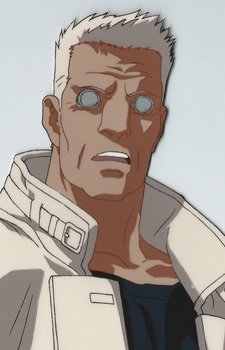Series & First Appearance
Batou first appeared in Masamune Shirow’s manga Ghost in the Shell, serialized from 1989 to 1990. He also features prominently in the first animated adaptation, Ghost in the Shell (1995), directed by Mamoru Oshii. The character has since appeared in various adaptations, including the Ghost in the Shell: Stand Alone Complex anime series and its follow-up films.
Profile at a Glance
While Batou’s exact age is unspecified, he appears to be in his late thirties or early forties. He serves as the second-in-command of Section 9, a law enforcement agency in a cyberpunk future. A highly skilled former Special Forces operative, he showcases significant physical abilities, aided by extensive cybernetic enhancements, particularly in strength and combat prowess.
Personality & Motivations
Batou is characterized as a straightforward, occasionally hot-headed individual with a strong sense of justice, often reacting emotionally to situations involving cruelty or injustice. Unlike his partner, Motoko Kusanagi, he demonstrates a more open, sociable demeanor, frequently engaging in levity through his jokes, even if it translates into rudeness towards new recruits like Togusa. He carries residual body image issues, evident in his fixation on fitness despite its limited relevance to his cybernetic body. His loyalty to Kusanagi is palpable, as he demonstrates a protective attitude towards her, often acting as a confidant during troubling situations.
Abilities / Powers
Batou is a highly trained operator with considerable expertise in hand-to-hand combat and weaponry. His combat style is aggressive and direct, often relying on physical strength afforded by his cybernetic limbs. Notably, his eyes are sophisticated prosthetics, equipped with features like night vision and enhanced targeting systems, although he prioritizes his old-style eye replacements due to superstition linked to military tradition. His training implies proficiency in stealth and tactical planning, likely honed during his tenure in the Japanese Ground Self Defense Force’s Ranger unit. However, his emotional responses occasionally cloud his judgment, leading to moments of impulsiveness.
Major Story Arcs & Growth
Throughout the Stand Alone Complex series, Batou’s character undergoes significant development, particularly in his relationship with Kusanagi. Their partnership is tested during various missions, with narrative arcs showcasing their reliance on one another. One pivotal moment occurs in the Solid State Society film, where Batou acknowledges his protective tendencies towards Kusanagi, especially in cases that invoke memories of their past together. His backstory reveals a tumultuous military past, including involvement in World War IV, which informs his deep-seated beliefs about justice and morality.
Notable Relationships
Batou shares a multifaceted relationship with Major Motoko Kusanagi, characterized by deep trust and emotional complexity. The romantic tension between them adds layers to their partnership, reflecting their shared experiences and mutual respect. His interactions with the rookie Togusa, a more grounded member of Section 9, often serve to highlight Batou’s more flippant nature, though he ultimately acts as a mentor of sorts. Other notable allies include his team members at Section 9, with whom he shares camaraderie and occasionally friction, adding depth to his role in the ensemble.
Iconic Moments & Quotes
One memorable line from Batou occurs in Ghost in the Shell: Stand Alone Complex when he quips to Togusa, “You have to pay for what you get,” underscoring his pragmatic view on justice and ethical decision-making (specifically from Season 1, Episode 16). This moment highlights his mentorship role and philosophical outlook on the missions undertaken by Section 9. Another impactful scene features him standing resolutely alongside Kusanagi as they confront moral dilemmas, emphasizing his unwavering support for her decisions.
Trivia & Behind-the-Scenes
Batou’s design and characterization have evolved through various adaptations, with consistent appearances in both manga and anime formats. In the original English dub, he was voiced by Richard Epcar, while in the Japanese version, he is voiced by Akio Ôtsuka. His popularity is reflected in online fan surveys, ranking him as a favorite character, with over 1,764 member favorites noted. The character’s role is deeply intertwined with themes of identity and technology, making him a pivotal figure in discussions surrounding cyberpunk narratives and the implications of cyborg existence. Batou’s fascination with traditional training and fitness juxtaposes sharply with the technological advancements inherent to his identity, showcasing a unique conflict within his character arc.
In conclusion, Batou stands out as a complex and multifaceted character within the Ghost in the Shell universe, embodying both the confounding intricacies of human identity and the relentless march of technology.







